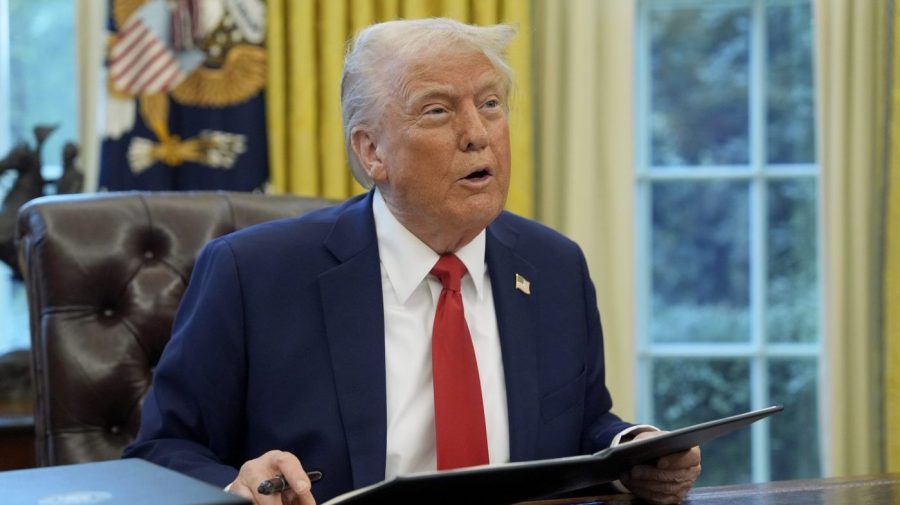
A federal judge on Monday declined to restore The Associated Press’s access to certain spaces open to the media at the White House, including the Oval Office amid the Trump administration’s battle against the wire service over its refusal to use “Gulf of America” in its popular stylebook.
U.S. District Judge Trevor McFadden, an appointee of President Trump during his first term, said at a hearing in Washington, D.C. that the AP failed to show a likelihood of success on the merits and emphasized that additional briefing on the matter is necessary “given the stakes” for both parties. He set an expedited schedule and ordered arguments on a preliminary injunction for March 20.
The AP sued three White House officials Friday for restricting its reporters’ access to the Oval Office and Air Force One over the organizations refusal to change its Stylebook guidelines to use “Gulf of America” in its AP Stylebook, after Trump said he was renaming the Gulf of Mexico as the Gulf of America. The Stylebook is used by news organizations across the industry for spelling, grammar and guidelines for how to refer to certain people and places in an effort for such references to be widely understood both in the U.S. and worldwide.
The wire service said in court filings its reporters have been barred since Feb. 11, a “targeted attack” on its editorial independence and ability to report news about the president. The lawsuit indicated the AP has been at the forefront of doing so since its creation more than a century ago.
Charles Tobin, a lawyer for the AP, said singling out the outlet, which is known for its influential AP Stylebook, served the administrations goals of “changing the national vocabulary.”
He called it an attempt to “coerce them to change how they report the news,” contending that the president could choose not to answer AP’s questions but couldn’t block them from the White House pool or other press corps events altogether.
Tobin also indicated that AP’s access has been continually restricted since the initial order barring their print journalists from the Oval Office. Now, AP’s photographers are banned, and AP journalists have been blocked from attending other broader access events, he said.
“The ground seems to keep shifting,” he said.
McFadden questioned the lawyer over the White House Correspondents Association’s role in deciding who’s allowed in the pool, calling it “a little odd” the White House is bound by the organization’s decision making and, at one point, suggesting it could “decide to throw out” the group altogether.
However, when questioning the Justice Department, the judge indicated that the White House’s block on AP seems to “pretty clearly” be “viewpoint discrimination.”
DOJ lawyer Brian Hudak said the case is a question of whether the president gets to decide who gets “special access” to him. The AP, he said, has historically received “extra special access,” given its unchanging pool assignments for one photographer and one print reporter. There are 13 White House pool slots, most of which rotate.
Taylor Budowich, the White House deputy chief of staff and one of the Trump officials named in AP’s suit in a statement said the news outlet’s policy is “not just divisive, but it also exposes the Associated Press’ commitment to misinformation.”
“While their right to irresponsible and dishonest reporting is protected by the First Amendment, it does not ensure their privilege of unfettered access to limited spaces, like the Oval Office and Air Force One,” Budowich said.
The AP builds its reputation as being a nonpartisan news agency that operates in state capitals across the country and in bureaus around the world. In its Stylebook guidance, the organization does suggest using the “Gulf of Mexico” to describe the body of water as to not confuse its global audience, while also explaining Trump’s changing of the name to “Gulf of America” after he took office.
White House Press Secretary Karoline Leavitt, who is also named in the suit, said during a speech last week at the Conservative Political Action Conference of the AP “we’ll see them in court,” and the said the administration feels it is “in the right in this position.”
Last week, AP Executive Editor Julie Pace traveled to Florida to meet with White House Chief of Staff Susie Wiles, a third official named in the outlet’s suit and who insisted to Pace the outlet consider revising its style on the body of water. Wiles told Pace she would speak with the president about the matter, the lawsuit states.
Several press freedom groups and the White House Correspondents Association have rallied behind the AP and urged the Trump administration to reconsider.
The spat with AP is being widely seen across media and political observers as a major escalation of the anti-press rhetoric on the part of the president. It is also seen as a mechanism to pressure the industry as a whole to adhere to language to Trump’s likening.
Trump has also threatened to use the power of the federal government to scrutinize major broadcasters and media companies over editorial coverage.
Trump during a press conference last week doubled down on his decision regarding the AP calling the wire service “obsolete” and saying, “they’re doing us no favors, and I guess I’m not doing them any favors, That’s the way life works.”












